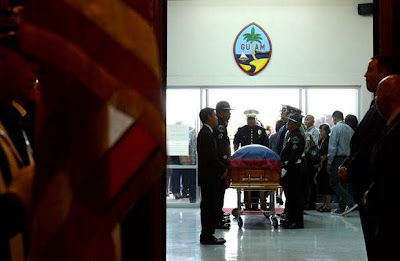A True Guam Historian
“Adios Tony”
by Michael Lujan Bevacqua
2/6/13
The Marianas Variety
 |
| From Guampdn |
Many people assume that since Guam is a small island, its
history can be known relatively easily. Someone who reads a book or spends some
time on this island can become an expert, since there cannot be that much to
know about this tiny rock in the Western Pacific right?
This is not how human communities work however. The
smallness has no relevance to its complexity, the depth of its experiences or the
contradictions that give it meaning. We here on Guam don’t often recognize
this. We see more value and potential in someone who studies the history of
larger place, than someone who studies the history of Guam. But for those who
know the history well, there is far more to this place than you can discover in
a lifetime of study. Tony Palomo, who passed away this past week was a
testament to that. He is someone who lived and breathed Chamorro/Guam history
for decades.
When I first began to study the island’s history at the University
of Guam, Tony Palomo was working at the Guam Museum. Whenever I would have
questions I would make an appointment with him. I would stop by his office and
we would sit for hours talking about the origins of family names, the everyday
lives of Chamorros under the US Navy before World War II, the origins of the
Chamorro diaspora and anything else I could think of. If he did not know the
answer he was always able to point me in the right direction and give me the
number of the next person that I should talk to.
He exemplified for me in so many ways the magic that a historian
can create for people. You could ask him any question, any set of questions,
and he could deftly move from topic to topic, recalling interviews he had done
decades ago, documents he had somewhere in his files. This is the magic of a
historian. The past is a chaos of events, and it can be daunting to make sense
of it all. A good historian can weave it all into a compelling story, that will
not only help you understand what happened in the past, but even provide an
insight for what that history might tells us about what to do next.
Palomo, along with several other historians instilled in me
a love of Guam History that I still keep until this day. He was never dull or
bored with history, but even into his final years always smiling and joking.
He was best known for his book “Island in Agony” which
discusses the Chamorro experiences in World War II. There is no shortage of
coverage in terms of this period in Guam History. You have a wide array of
articles, documentaries and books. Palomo’s stands out as an attempt to weave
together as many elements of the war saga as possible. He sought to bring out
the tragedy, the cruelty, but also the humor, the love, the complexity. In it he
tried to create an homage to an island of survivors.
He always talked about publishing more books, he certainly
had a lot of writings, a lot of research and a lot to say, but another book
never materialized.
I have so many fond moments of Tony Palomo, but my fondest
is when I arranged for him to be interviewed for a documentary “The War in
Guam.” The documentary was intended for a stateside audience and so each
interview was closed with a question as to what they wanted the American people
to know about Guam. If they could speak directly to them about Guam, what would
they tell them about it? Most people responded with requests that they
recognize the Americaness of the island and stop disrespecting Guam and its
people! I expected a similar answer from Palomo, and he truly surprised
me.
He responded, his eye twinkling, with a half smile, that
maybe he didn’t want the US to know much about Guam. So much of life on Guam is
about proving ourselves to the United States and wanting them to recognize us. Although
Palomo was of that generation that people (myself included) sometimes dismiss
as being unable to critique the United States, he was hardly so. The value that
we see to our speck of home in the Pacific is not the same as what others such
as Spain, the US or Japan may see. It may not be right, but Palomo said the
more they know about us, the more they see our value and take things away for
their own interests. As a journalist, a politician and a historian he was aware
of the contradictory and colonial nature of Guam’s relationship to the United
States, but was uncertain about how to resolve it. Until Guam actually changes
its political status and gets some inherent rights he said, a little friendly
ignorance might be helpful in protecting ourselves.



Comments